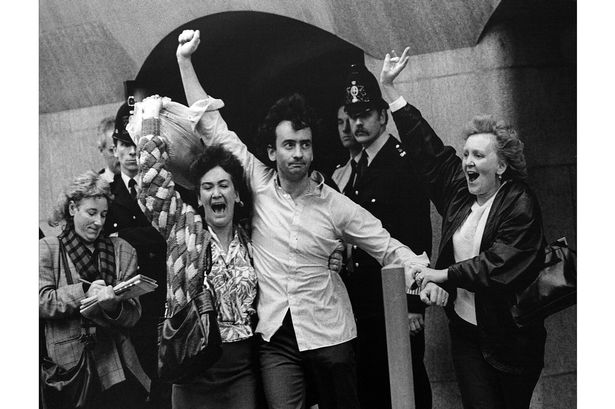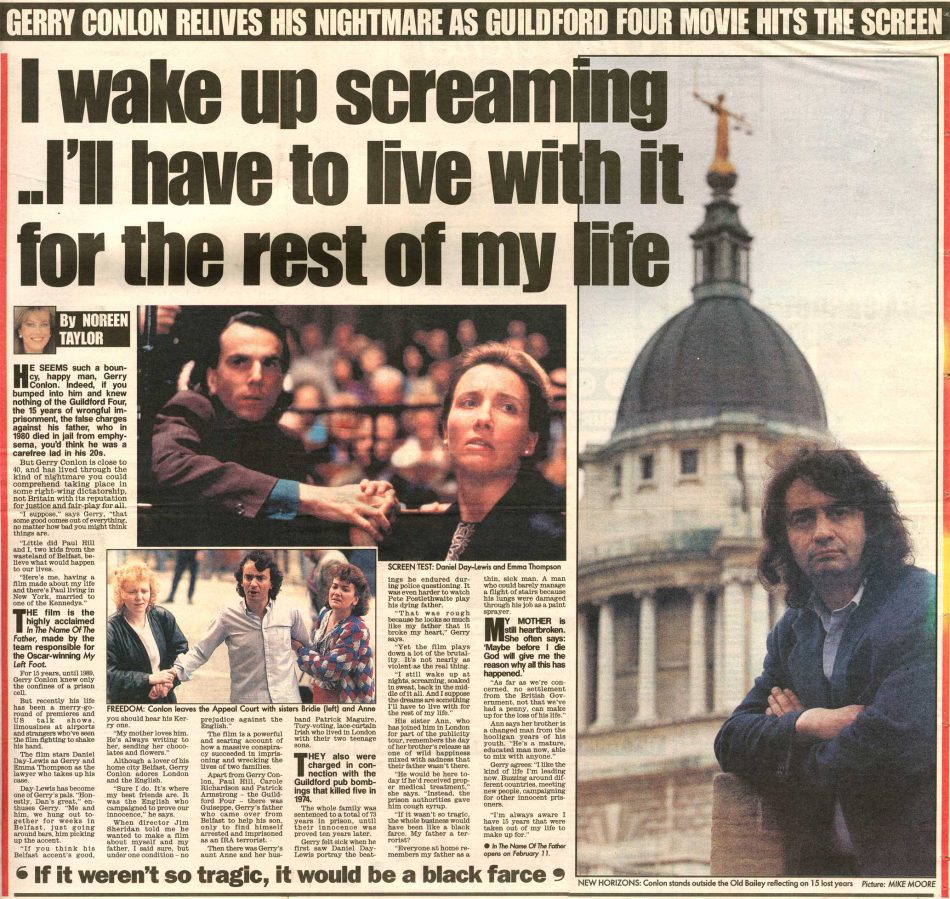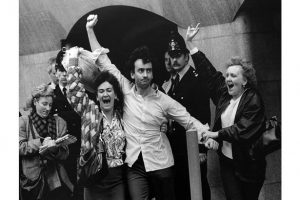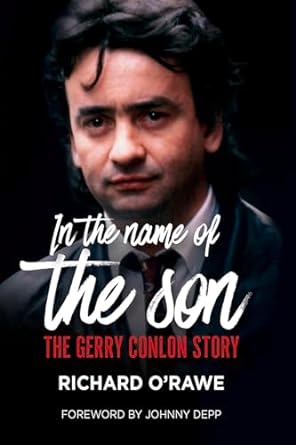
Guildford Four: how the innocent were framed and the truth buried
Page Description
Uncover the story of the Guildford Four, wrongfully convicted in 1974. Learn about the injustice, their fight, and the case’s impact on justice reform.
The Guildford Four who were kidnapped by the British state & tortured into making false confessions are sentenced by a corrupt judge & a rotten system. They would spend 15 years in prison until they were freed in 1989.
RIP Gerry Conlon & Giuseppe Conlon
The Guildford Four: A Miscarriage of Justice
‘The Guildford Time-Bomb’ First Tuesday 1986 – Troubles Documentary
In première gegaan op 26 dec 2023 #ATroubledLand #JoinPatreon
☢️VIEWER DISCRETION IS ADVISED☢️
‘The Guildford Time-Bomb’ First Tuesday 1986
Coming on the heels of Aunti Annies Bomb Factory and a World in Action still to come as well as a documentary from First Tuesday just after their release (coming soon) this documentary goes in depth into the innocence of the Maguire and Guildford accused.
The story of the Guildford Four stands as one of the most notorious miscarriages of justice in British history. Wrongfully convicted in 1975 for the Guildford pub bombings, these four individuals endured years of imprisonment for crimes they did not commit. Their plight exposed deep flaws in the justice system, raising profound questions about truth, fairness, and accountability.
This page brings their story to life through detailed explanations and compelling videos. Discover how their fight for freedom became a turning point, shedding light on systemic failures and the resilience of those who refused to accept injustice.
Het verhaal van de Guildford Four geldt als een van de meest beruchte gerechtelijke dwalingen in de Britse geschiedenis. Onterecht veroordeeld in 1975 voor de bomaanslagen in Guildford, moesten deze vier personen jarenlang gevangenschap doorstaan voor misdaden die ze niet hadden begaan. Hun lot onthulde diepe tekortkomingen in het rechtssysteem en roept diepgaande vragen op over waarheid, rechtvaardigheid en verantwoordelijkheid.
Deze pagina brengt hun verhaal tot leven met gedetailleerde uitleg en meeslepende video’s. Ontdek hoe hun strijd voor vrijheid een keerpunt werd, waarbij systematische fouten aan het licht kwamen en de veerkracht werd getoond van degenen die weigerden onrecht te accepteren.
Panorama: Guildford The Untold Story – A 1990 Troubles Documentary
Panorama: Guildford The Untold Story – A 1990 Troubles Documentary
This powerful documentary takes an in-depth look at the tragic story of the Guildford Four, exploring how innocent individuals were wrongly convicted and tortured into making false confessions. It uncovers the flaws and corruption within the justice system, shedding light on the deep flaws of a system that failed to protect the rights of the innocent.
With new insights and firsthand accounts, “Guildford: The Untold Story” reveals the heartbreaking realities faced by those who were wrongfully convicted and the long journey to justice that followed. Watch the video to understand how this infamous miscarriage of justice came to light, and the personal and social impacts it left behind.
Panorama: Guildford The Untold Story – Een documentaire over de Troubles uit 1990
Deze krachtige documentaire gaat dieper in op het tragische verhaal van de Guildford Four, en onderzoekt hoe onschuldige mensen ten onrechte werden veroordeeld en gemarteld om valse bekentenissen af te leggen. Het werpt licht op de gebreken en corruptie binnen het rechtssysteem en onthult de diepe tekortkomingen van een systeem dat faalde in het beschermen van de rechten van de onschuldigen.
Met nieuwe inzichten en getuigenissen werpt “Guildford: The Untold Story” een verhelderend licht op de hartverscheurende realiteit waarmee de onterecht veroordeelden werden geconfronteerd, en de lange weg naar gerechtigheid die daarop volgde. Bekijk de video om te begrijpen hoe deze beruchte gerechtelijke dwaling aan het licht kwam, en welke persoonlijke en maatschappelijke impact het had.

In the Name of Gerry Conlon | Trailer | Available Now
In 1974, Gerry Conlon was a victim of one of the worst judicial crimes in UK history. Aged 20, he and 3 others were sentenced to life in prison for an IRA bombing. “The Guildford Four” had to wait until 1989 for the court to recognize the evidence was false. Conlon became a world-famous human rights activist. Director Lorenzo Moscia met Gerry two months before his death, recording this testament to a remarkable life.
The Guildford Four : Free to Speak – 1989 First Tuesday Documentary
Educational: A Must-Watch
The Guildford Four were a group of four Irish men who were wrongfully convicted in 1975 of carrying out bombings in Guildford, England. The key points of their case include:
Arrest: The four men were arrested in 1974 in connection with IRA bombings in Guildford, which killed five people and injured many others.
Conviction: After a trial in 1975, they were convicted and sentenced to life in prison. The convictions were based on confessions obtained through coercion and intimidation by the police.
Appeals: The Guildford Four appealed their convictions, but their appeals were rejected. The British judiciary believed that their confessions were reliable and that there was other evidence that supported their convictions.
Public support: The case attracted significant public attention, and many people believed that the Guildford Four were innocent. There were protests and campaigns to have their convictions overturned.
New evidence: In 1989, new evidence came to light that suggested that the Guildford Four were innocent. The evidence included a confession from another man who had been involved in the bombings, as well as forensic evidence that was inconsistent with the prosecution’s case.
Release: The Guildford Four were released in 1989 after serving 15 years in prison. Their convictions were overturned on the basis of the new evidence.
Aftermath: The case led to a significant public outcry and highlighted the problems with the British criminal justice system, particularly regarding the use of confessions obtained through coercion. It also led to changes in the law regarding the admissibility of confessions in court.
Stories from The Justice Gap
Guildford Four: how the innocent were framed and the truth buried
On October 5, 1974 two public houses in Guildford, Surrey were bombed by the IRA without warning causing five deaths and over 60 injuries of varying severity. The bombs were placed in the pubs with timing devices to detonate when the bomb placers were clear of Guildford.
Read more on the link below
Guildford Four: how the innocent were framed and the truth buried

1 Guildford Four inquiry papers show reconviction attempts – Emma Vardy
Back to menu IMPORTANT CONTENT
27 okt. 2016
THE GUILDFORD FOUR | SOLICITOR ALISTAIR LOGAN | TN-85-010-008
15 dec. 2014.
1989 October 19
Guildford Four are cleared of IRA bombings
The Guildford Four, convicted of the 1975 IRA bombings of public houses in Guildford and Woolwich, England, are cleared of all charges after nearly 15 years in prison.
On October 5, 1974, an IRA bomb killed four people in a Guildford pub frequented by British military personnel, while another bomb in Woolwich killed three. British investigators rushed to find suspects and soon settled on Gerry Conlon and Paul Hill, two residents of Northern Ireland who had been in the area at the time of the terrorist attack.
Guildford Four Release: Historic Injustice Overturned – Archive Documentary (1989)
Back to menu IMPORTANT CONTENT Listening recommended
19 okt 2023
On 19 October 1989, the Guildford Four were released after 15 years of wrongful imprisonment. Gerard Patrick “Gerry” Conlon, Paul Michael Hill, Patrick Joseph “Paddy” Armstrong, and Carole Richardson were arrested and charged with terror-related offences following the Guildford pub bombings of 5 October 1974 and the Woolwich pub bombing of 7 November 1974. Under intense coercion at the hands of the Surrey police – ranging from intimidation, threats against family members, and torture — the four made false confessions to the bombings. Convicted and given life sentences, the judge informed them that, had they been charged with treason, they would have been hanged. It would take 15 years and the steadfast campaigning by family members of the Guildford Four to see their convictions overturned. Using raw footage from the day, including interviews with Gerry Conlon, his relatives, and the family of Paddy Hill, this special documentary recounts the dramatic and emotional events of the day the Guildford Four were released.
For a small number of high profile cases related to the ongoing Troubles in Northern Ireland, the release of the Guildford Four acted as a watershed moment. The Maguire Seven, relatives of Gerry Conlon who were jailed on separate charges, also had their convictions overturned – though by that time all had served their full sentences or, in the case of Gerry Conlon’s father, Giuseppe Conlon, died in prison. The Birmingham Six, another high profile group jailed under similar circumstances following the Provisional IRA’s bombings of two pubs in Birmingham in 1974, were released less than 18 months after the Guildford Four.
The Guildford Four : 50 Years – Major Troubles Documentary (ATL Top Pick for 2024)
Video Information: The Guildford Four : 50 Years – Major Troubles Documentary (ATL Top Pick for 2024)
This documentary is my pick for best documentary of 2024.
A bold statement you would say but when a doc brings me to tears and trust me this doc will scream emotion into your very soul then it has my undivided attention.
Think you know the full story of the Guildford Four – its not over…
Educational: A Must-Watch
Educational: A Must-Watch
2 Gerry Conlons Most Powerful Speech!
26 nov. 2019
3 In The name of Gerry Conlon. TRAILER
1 mrt. 2015



Educational: A Must-Watch
4 Life After Life A Guildford Four Memoir
13 sep. 2017
5 Jim Sheridan looking back on In the Name of the Father (1993)
29 jul. 2015
Educational
6 IRA campaign in England 1974-75 Guildford Birmingham Bombs Balcombe Street Gang
Back to menu IMPORTANT CONTENT Listening recommended Must
4 feb. 2018
7 Guildford Four’s Gerry Conlon RIP
9 Gerry Conlon and Paddy Hill speaking at the University of Limerick, School of Law
18 mrt. 2014
10 Miscarriage of Justice: The Guildford Four and the Maguire Seven (UK – 1974)
30 apr. 2021
The Guildford Four and the Maguire Seven were the collective names of two groups whose convictions in English courts in 1975 and 1976 for the Guildford pub bombings of 5 October 1974 were eventually quashed after long campaigns for justice.
The Guildford Four were wrongly convicted of bombings carried out by the Provisional Irish Republican Army (IRA), and the Maguire Seven were wrongly convicted of handling explosives found during the investigation into the bombings. Both groups’ convictions were eventually declared “unsafe and unsatisfactory” and reversed in 1989 and 1991 respectively after they had served up to 15–16 years in prison.
Along with the Maguires and the Guildford Four, several other people faced charges relating to the bombings, six of them charged with murder, but these charges were dropped.
No one else was charged with the bombings, or supplying the material; three police officers were charged with conspiracy to pervert the course of justice and found not guilty.
After their arrest, all four defendants confessed to the bombing under intense coercion by the police.
These statements were later retracted but remained the basis of the case against them. They would later be alleged to be the result of coercion by the police, ranging from intimidation to torture—including threats against family members—as well as the effects of drug withdrawal.
Conlon wrote in his autobiography that a key factor in his purportedly coerced confession was the fact that strengthened anti-terrorism laws passed in the early 1970s allowed the police to hold suspects without charges for up to a week, rather than the previous limit of 48 hours and that he might have been able to withstand the treatment he had received had the original time limit been in effect.
11 MUA Melbourne meeting 2011 Gerry Conlon Part 1
10 aug. 2011
12 MUA Melbourne meeting 2011 Gerry Conlon Part 2
10 aug. 2011
13 Gerry Conlon reading from his book Proved Innocent
29 okt. 2013
14 Marxism 2010 – Mozzam Begg, Gerry Conlan and Gareth Peirce – Was it like this for the Irish?
Back to menu IMPORTANT CONTENT

15 In The Name Of The Father end scene and credits.
16 In the Name of the Father (1993) – Not to Be Shown to the Defense Scene (9/10) | Movieclips
8 okt 2020
In the Name of the Father – Not to Be Shown to the Defense: Gareth (Emma Thompson) presents evidence that the British government knew Gerry (Daniel Day-Lewis) was innocent.
FILM DESCRIPTION:
Unemployed young Irishman Gerry Conlon (Daniel Day-Lewis) gets by as a petty thief in 1970s Belfast. When local IRA leaders get fed up with him, he flees to England and meets up with his friend Paul Hill (John Lynch). On the same night that the IRA bombs a nearby pub, the friends get kicked out of their communal digs and are forced to sleep in a park. He returns to Belfast, but is arrested as the prime suspect in the bombing and imprisoned, where he spends 15 years trying to clear his name.
CREDITS:
TM & © Universal (1993)
Cast: Corin Redgrave, Daniel Day-Lewis, Emma Thompson
Director: Jim Sheridan
Screenwriter: Jim Sheridan, Terry George

In the Name of the Son: The Gerry Conlon Story Paperback
Illustrated, 18 Oct. 2017
“This book is a tour de force . a chronicle of the triumph of the human spirit over extreme adversity. It is a story of hope. It is the story of a man I loved and would have taken a bullet for.” –Johnny Depp ***An electrified young man, with eyes wild and a clenched fist, bursts out of the Old Bailey and declares his innocence to the world. Gerry Conlon has just won his appeal for the 1974 Guildford pub bombing. After fifteen years in prison, freedom beckons. Or does it? Following his release, Conlon received close to one million pounds from government compensation, movie and book deals; he ran in the same circles as Johnny Depp, Daniel Day-Lewis, and Shane MacGowan. Conlon seemed to have it all. Yet within five years he was hooked on crack cocaine and eating out of bins in the backstreets of London. Beyond the elation of his release was the awful descent into addiction, isolation and self-loathing. But this is a book about the resilience of the human spirit. What emerges from the darkness and the addiction is Gerry Conlon the pacifist; the man who came to be recognised around the world as a campaigner against miscarriages of justice. In the Name of the Son also reveals damning new evidence of statement tampering by the authorities which would’ve cleared Conlon at the initial trial. Life-long friend, Richard O’Rawe, has written a powerful and candid story of Gerry Conlon’s extraordinary life following his years of brutal incarceration at the hands of the British justice system. [Subject: Irish Studies, British Studies, Biography, History, Criminal Justice]
A Great British Injustice: The Maguire Family and Their Fight for Justice
17 A Great British Injustice : The Maguire Story – Troubles Documentary 2019
In this powerful 1997 RTÉ documentary, ‘The Wrong Man: Danny McNamee,’ the devastating impact of a wrongful conviction is laid bare. McNamee, a young man from Northern Ireland, was wrongfully imprisoned for a crime he did not commit, his life shattered by a miscarriage of justice. This documentary offers a chilling insight into the flaws of the justice system and the fight for truth and redemption.
Een Grote Britse Onrechtvaardigheid: Het Maguire-gezin en Hun Strijd voor Gerechtigheid
Deze indringende documentaire vertelt het hartverscheurende verhaal van het Maguire-gezin, dat ten onrechte werd veroordeeld in verband met de bomaanslagen in de Guildford-pubs. Hun onophoudelijke zoektocht naar gerechtigheid, ondanks jaren van lijden en onrecht, is een getuigenis van de kracht van de menselijke geest tegenover een diep gebrekkig rechtssysteem. Kijk hoe hun lange strijd voor waarheid en verantwoordelijkheid zich ontvouwt, en ontdek de pijnlijke gevolgen van een gerechtelijke dwaling.
The Guildford Four: A Miscarriage of Justice
18 ‘The Wrong Man: Danny McNamee’ – A 1997 Prime Time RTÉ Troubles Documentary
In première gegaan op 8 jun 2025 #ATroubledLand #JoinPatreon
☢️VIEWER DISCRETION IS ADVISED☢️
Video Information: ‘The Wrong Man: Danny McNamee’ – A 1997 Prime Time RTÉ Troubles Documentary
In this powerful 1997 RTÉ documentary, ‘The Wrong Man: Danny McNamee,’ the devastating impact of a wrongful conviction is laid bare. McNamee, a young man from Northern Ireland, was wrongfully imprisoned for a crime he did not commit, his life shattered by a miscarriage of justice. This documentary offers a chilling insight into the flaws of the justice system and the fight for truth and redemption.
In deze krachtige RTÉ-documentaire uit 1997, The Wrong Man: Danny McNamee’, wordt de verwoestende impact van een onterechte veroordeling blootgelegd. McNamee, een jonge man uit Noord-Ierland, werd onterecht gevangen gezet voor een misdaad die hij niet had begaan, zijn leven verwoest door een gerechtelijke dwaling. Deze documentaire biedt een huiveringwekkend inzicht in de gebreken van het rechtssysteem en de strijd voor waarheid en gerechtigheid.
19 Public Parking Taxi


Stan phillips
3 jaar geleden